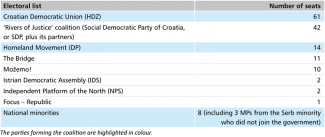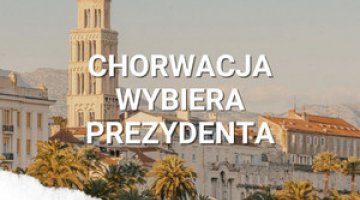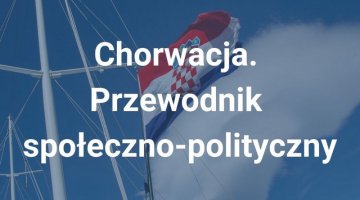Croatia: Plenković’s third government, and a turn to the right
On 17 May, the Croatian parliament passed a vote of confidence in the coalition government of Andrej Plenković, the leader of the Croatian Democratic Union party (HDZ), who will serve as prime minister for the third consecutive time. His cabinet is made up of members of the centre-right HDZ, the national-conservative Homeland Movement (DP) and national minorities, but it excludes the party that represents the Serb community.
The new government includes no fewer than seven deputy prime ministers; there are only two women in the 18-member Council of Ministers. The coalition currently has a majority of 79 votes in the 151-seat unicameral parliament (see Table). As a result of the coalition negotiations, the Homeland Movement secured three ministries: those responsible for the economy (which was split, with the HDZ taking over the area of sustainable development) and agriculture, as well as the newly created ministry of demography and emigration. The government’s programme focuses on key issues in domestic policy, such as the macroeconomic stability of the economy, tackling depopulation, increasing minimum wages and pensions, investing in railway infrastructure, combating corruption and securing the borders.
Commentary
- The Christian Democrats’ election victory and Prime Minister Plenković’s third consecutive term in office represent a bittersweet victory for this politician as he was obliged to form a coalition with the Homeland Movement, which has its roots in the right wing of the HDZ. Cooperation between the future coalition partners will be all the more difficult as both parties’ election campaigns were focused on criticising each other. In addition, the DP has been pushing for a shift towards national-conservative values, while the HDZ has been gradually moving away from them (see ‘Parliamentary elections in Croatia: the president challenges the Christian Democrats’). Having radicals in government is a problem for Plenković, who has so far been building his image as a pragmatic and pro-European leader; notably, he has brought Croatia into the Eurozone and the Schengen area. Thus he will now find it more difficult to fend off the mounting accusations that he has been lowering democratic standards and violating the rule of law and freedom of the media. During his previous term, his government politicised the public prosecutor’s office, introduced legislation against so-called whistleblowers and arbitrarily redrew the country’s electoral constituencies.
- The DP’s joining the coalition will shift Croatian politics towards a debate on ideological issues, including a dispute over how to assess the history of World War II, Yugoslavia and the war of the 1990s, as well as issues such as the rights of national/sexual minorities and the possible tightening of the abortion law. On the declarative level, we can expect Croatia’s relations with Serbia to deteriorate; indeed, one of the DP’s conditions for joining the government was to remove the Serb minority’s SDSS party from power. Moreover, the Croatian government will step up its efforts to protect the rights of its compatriots in Bosnia and Herzegovina. However, contrary to its earlier statements, the Homeland Movement did not insist on taking over the ministries that make decisions on ideological changes, such as those in charge of education or culture. Instead, the party will run the economic ministries, which are also important to its members because of their private links to the energy and agricultural business. Most of the HDZ ministers from the previous term will remain in charge of their ministries.
Table. Distribution of seats in the Croatian parliament after the elections of 17 April

Source: State Electoral Commission, izbori.hr.





